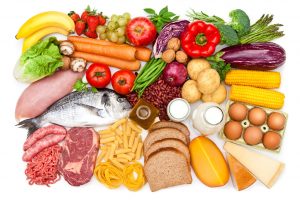
Cataracts affect one in six Americans 40 and older. Women are especially susceptible to cataracts and other eye conditions because of hormonal changes due to menstruation, pregnancy and menopause. One of the most effective ways to prevent degenerative eye diseases like cataracts is with a healthy diet full of antioxidants.
Antioxidants are chemicals found in fruits, vegetables and whole grains that combat the effects of oxidative stress in the environment. No single antioxidant can neutralize all free radicals, so it is important to eat variety of antioxidant-containing foods. Here are foods that you can add to your menu to strengthen your eyes and prevent cataract-related vision loss:
Fruits and Vegetables
Studies show we need between five and nine servings of fruits and vegetables per day for optimal eye health. More matters when it comes to healthy produce, and it is important to choose a colorful variety. Fruits and vegetables offer the highest total antioxidant capacity of all foods, so make these the building blocks of your diet.
While at the grocery store, select a fruit or vegetable for each color of the rainbow. How about red strawberries, orange tangerines, yellow peppers, green kale, indigo blueberries and purple eggplant? Try to choose organic fruit and eat the skins of fruits and vegetables since they are full of vitamins A, C and E, as well as lutein and zeaxanthin.
Whole Grains
To prevent cataracts, eat three servings of 100 percent whole grains. This can include amaranth, brown rice, bulgur, buckwheat, millet, oatmeal, popcorn, sorghum, quinoa, rye and wheat. Some of these grains may be unfamiliar to you, but be adventurous. Look up some recipes and try something new!
You can also boost your eye health by making wiser choices when you purchase bread and other baked goods. Read food labels carefully, avoiding white bread and bakery items that contain refined grains and sugars and choosing items that are minimally processed.
Fish
Omega-3 fatty acids are also known to reduce the risk of cataract development and progression. Good sources of omega-3 fatty acids include shrimp, tuna, cod, salmon, halibut, trout, herring, walnut, flaxseed oil, canola oil and spinach. Eat fish at least twice per week to nourish your eyes and protect your vision.
Seeds and Nuts
Nuts and seeds are great sources of vitamin E, an antioxidant that helps protect membranes of eye cells from free radical damage. Some of the best choices for eye health are almonds, walnuts, hazelnuts, peanuts and sunflower seeds.
May is Women’s Health Month, a time for women to renew their commitment to their own health. Ladies, remember that your visual health is just as important as your family’s, so set aside an hour for yourself and get your eyes examined. A comprehensive eye exam is the best way to preserve your vision and prevent eye disease before it develops.
